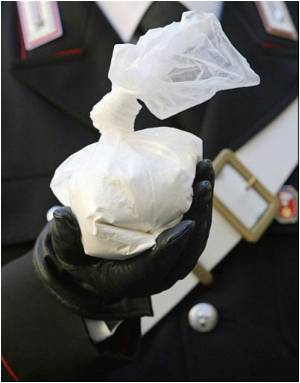Marwan is only 13, and look at how he actually hides the little colourful pills in his socks to trick his supervisors at school.

In a good month, Marwan makes 3,000 dollars (around 2,440 euros) selling the tablets to mainly older friends -- 10 times the minimum wage in Lebanon or what he could earn for a summer job.
But the high school student, who hails from a wealthy family from southern Lebanon, insists he is not in the drug business for the money.
"The money's not that important," Marwan explains. "It's the halo of power, plus sometimes it guarantees sex with the girls who are asking for the pills."
Experts are concerned that drugs are a growing problem in Lebanon, and police statistics show a staggering rise in the confiscation of ecstasy, in particular, from 400 tablets in 2008 to 17,312 tablets in 2009, when authorities stepped up a national crackdown on drug rings.
"The drug phenomenon as a whole is on the rise in Lebanon," Colonel Adel Mashmoushi, who heads the police's narcotics unit, told AFP.
Advertisement
In Lebanon, punishment for the possession of drugs is up to three years imprisonment with a fine of up to 3,300 dollars, and drug dealers face life in prison with a fine of up to 33,500 dollars.
Advertisement
"There are people selling pills in universities and schools... and even some prominent families are lamenting that their sons and daughters are losing their way," Nasrallah said in a speech late last year.
Nadia Mekdashi, the director of Skoun, a prominent local non-governmental organisation that offers counselling to addicts, says the main reason for the increase in drug use is lack of control and regulation.
While there are no official figures, Skoun estimates that between 10,000 and 15,000 people -- most of them aged 15 to 25 -- can be classified as addicts in Lebanon, which has a population of four million.
The organisation also estimates that the number of occasional users is rising exponentially.
Along with alcohol, stimulants like ecstasy have the fastest-growing consumer base in Lebanon after heroin, hashish and cocaine, according to Skoun.
The drug trade first flourished into a multi-billion dollar industry during Lebanon's 1975-1990 civil war, especially in the eastern Bekaa Valley, fertile ground for drug cultivation and trafficking.
Ecstasy, a synthetic psychoactive drug that induces a sense of euphoria, entered the Lebanese market in the early nineties, according to Skoun.
Today it is a popular drug among rave-goers in the capital.
"People generally take ecstasy in environments with loud music and a lot of physical movement," said public health professor Amjad Kanaan.
"The downside is that the sense of euphoria and ease with surroundings it creates soon crash and are replaced with fatigue and a sense of depression," Kanaan told AFP.
The drug can also cause organ failure, convulsions and heart failure while long-term use can result in damage to certain parts of the brain, according to symptoms outlined by UNODOC.
Mashmoushi said Lebanon still imported ecstasy for the most part, primarily from Eastern European countries followed by countries in Western Europe.
"There are primitive attempts to set up underground laboratories and produce the tablets locally," he said, adding that police had arrested a number of would-be producers.
But a handful of labs still stand outside of the capital, including one in the overpopulated Burj Hammud suburb east of Beirut and two in the Bekaa, according to 26-year-old dealer Walid.
Even though they are more expensive, imported pills remain popular as they are more "powerful" than locally-produced ones, said Walid, who declined to give his surname.
"After raves and events hosted by major DJs appeared on the Lebanese scene five years ago, each pill would sell for 20,000 pounds (13 dollars, 10.8 euros) on a regular day and double the price at a rave," he told AFP.
It was at such an event that Marwan was introduced to the tinted tablets, and he says he has never looked back.
"No one cares what I do at home anyway," said Marwan.
"I don't worry about getting arrested. If I do, I know my dad will bail me out."
Source-AFP











